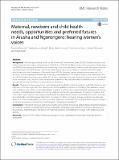| dc.description.abstract | With the approaching sunset on the Millennium Development Goals (MDGs), Tanzania continues with
its final national push towards achievement of MDG #4 and MDG #5. The Mama Kwanza Socio-economic Health Initiative
(MKSHI) was introduced in the hope of contributing to improving maternal, newborn, and child health in Arusha
and Ngorongoro. The MKSHI project is a holistic, inter-sectoral approach to maternal, newborn, and child health
which aligns with the Government of Tanzania’s Vision 2025. At the project onset, a baseline assessment was conducted
to launch ongoing benchmarking, monitoring, and evaluation of the project’s impacts and implications. The
aim of this baseline assessment was twofold. First it was to determine the state of maternal, newborn, and child health
in the two project sites. Second it was to ensure that a baseline of key indicators was established as well as identification
of unique indicators relevant to the populations of interest. | en_US |

